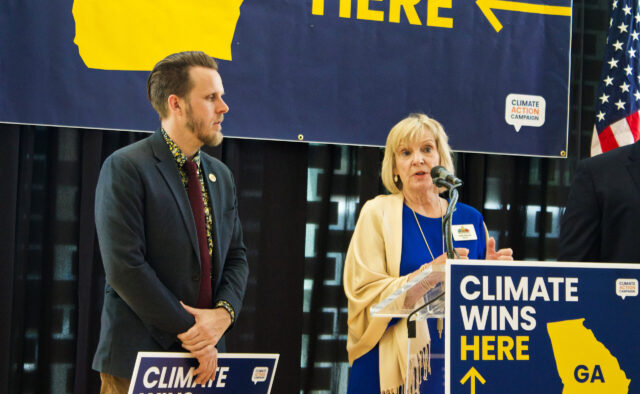Atlanta-Based Nonprofit to Develop Roadmap to Eco-Friendly Future
DEKALB COUNTY, GA (July 31, 2023) -– As part of widespread efforts to improve sustainability in DeKalb County under the Clean Energy Transition Plan, Southface Institute, an Atlanta-based sustainable building nonprofit, has been selected to steer the county towards a future of 100% clean energy, defined as energy produced through means that do not directly pollute the atmosphere. Southface will develop an extensive energy transition plan to be presented to county leadership by August 2024 and will partner with four other organizations – Atlanta-based Cherry Street Energy, Atlanta-based Clean Cities Georgia, Atlanta-based IB Environmental, and Maryland based Energetics.
“Southface is excited to continue working with DeKalb County to set and achieve ambitious goals that benefit residents, businesses, community services, and the environment,” said James Marlow, President of Southface Institute. “With county staff, Clean Cities Georgia, Cherry Street Energy, and other sustainability leaders collaborating, this outstanding team has what it takes to make a real impact.”
Components of this transition plan will include recommendations on how to enhance the use of solar energy in municipal buildings, increase the number of clean energy vehicles, increase equity, and address “energy burdens” (the percentage of gross household income spent on energy costs) within the county. It will also include strategic opportunities for public education, which will begin as early as fall 2023. The funding for the plan came from the 2022 Fiscal Year General Fund Budget, an agenda item sponsored by District 6.
This partnership and plan development is another step towards making DeKalb a 100% clean energy county, a commitment the Board of Commissioners made in 2021 via unanimous vote. The 2021 resolution calls for the county to transition to use 50% renewable energy by 2025, and 100% by 2035. By 2045, the county would be using 100% clean energy community-wide.
DeKalb County Commissioner Ted Terry, a longtime environmental activist, champion of the Clean Energy Transition Plan, and leader of the DeKalb Green New Deal movement, says the partnership with Southface is a thrilling development that he’s been eagerly awaiting.
“Passing our transition plan in 2021 was a historic achievement. I knew even then that Southface was the right group for the job,” Commissioner Terry said. “Now and future generations need an action plan to save our planet, and that is exactly what we are developing with Southface and other tremendous environmental leaders. Together, we will make DeKalb a greener, more equitable place for all.”
Work on this yearlong project has already begun, partnering first with Energetics and IB Environmental to inventory greenhouse gas usage by government facilities and vehicles. Southface Institute will announce its initial public education and discussion sessions in August, allowing community members to get involved in this monumental process for the county.
Additional Partner Quotes:
As a small, local firm, IB Environmental is excited to be part of this project. Assessing and promoting energy equity for DeKalb County residents resonates deeply with our mission to increase the appreciation for water and energy resources, while promoting sound environmental policy through research, education, and action. We are looking forward to working with our partners Southface, Energetics, and Cherry Street to improve energy efficiency and low-emission strategies in DeKalb County.
-Stacey Isaac Berahzer, Founder and CEO, IB Environmental
“Energetics has a long history of supporting energy resilience planning and the development of clean transportation solutions, and we’re looking forward to working on solutions that impact the citizens of DeKalb County. We are equally excited to partner with Southface, Clean Cities Georgia, IB Environmental, and Cherry Street Energy to contribute our expertise to the development of the County’s Clean Energy Transportation Transition Plan.”
-Walt Zalis, Program Director, Energetics Inc.
“Clean Cities Georgia is excited to partner with DeKalb County on their Clean Energy Transportation Transition Plan. We have assembled knowledgeable partners with Southface, IB Environmental, Cherry Street Energy and Energetics. DeKalb is leading in developing sustainable buildings and transportation infrastructure. We think this is a model that can be replicated with other municipalities.”
-Frank Morris, Executive Director, Clean Cities Georgia
“The Cherry Street Energy team is thrilled to support DeKalb County in its pursuit of this meaningful 100% clean energy goal. This project shows the leadership and commitment necessary to find impact for the community in the transition to renewable energy.”
-Michael Chanin, CEO, Cherry Street Energy
# # #
ABOUT DeKalb County Super District 6 Commissioner Ted Terry
Contact: Kelly Cato, Chief of Staff, DeKalb County, District 6, kecato@dekalbcountyga.gov
Press Contact: Kae Holloway, Publicist, kholloway@pineapple-pr.com

